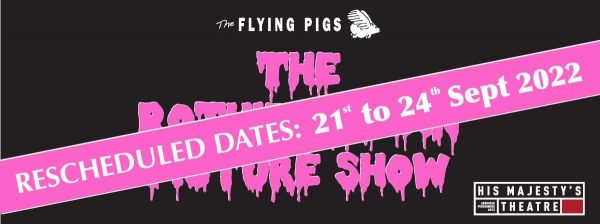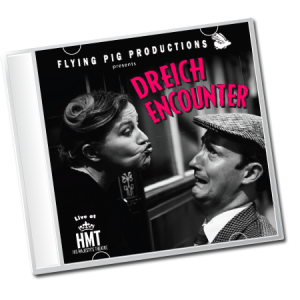Steve Robertson M.B.E.
We were deeply saddened by the recent death of Scotland the What’s Steve Robertson. Steve had been an enormous influence on us; both as a writer and performer we greatly admired, and also as a very kind and supportive friend. Greg Gordon writes, in tribute, on behalf of us all.
STW? were (and are) a huge influence on me. One of the strongest memories of my childhood is of listening to their records over and over again; listening to the words of the sketches, obviously, but listening too to the laugh, that joyful, addictive sound that would rise up, peak and then, just as it was abating, suddenly peak again. I used to sit and wonder what expression or piece of onstage business had caused the laugh to rise again? And (as I imagined form the records, and subsequently saw in the flesh at His Majesty’s Theatre) Steve really could work a laugh, taking it to new heights with a word or a gesture, riding it to the maximum extent of the audience’s enjoyment and then coming back in again with the next line at just the right time.
I grew up speaking Doric (or at least “Doric-lite”) at home, but not outside it. The idea that the language of my parents and grandparents was something to cherish and celebrate in writing might never have occurred to me without Steve, Buff and George. The idea that they might hear something I had written and actually find it worth listening to was beyond all imagining; but as loyal supporters of the Student Show which spawned them, they did hear my material (and that of many other writers besides) and were scrupulous in seeking us out. I first met Steve in 1994 in the Stalls Bar of his Majesty’s Theatre when I was one of a group of writers ushered towards him after he had offered his congratulations to the performers and then asked “But who wrote this? Who wrote it? The writers are always forgotten.” I was fortunate enough to meet him many more times besides, usually after a Student Show or a Flying Pig production. “Never meet your heroes” be damned, he was an absolute gent, always unstinting with his encouragement. There could be the occasional criticism, too: he had an intense dislike of vulgarity in comedy and would soon tell you if he thought you had cheapened yourself (“You don’t need it, you don’t need it.”) But it was always with the best of intentions, and with the knowledge that times were changing: what was right for him was not necessarily right for the whole audience. His views were offered not forcefully, but for whatever they were worth; usually, a great deal.
One evening I will cherish is the night I fell in with him on the way up the road from a Society of Advocates in Aberdeen dinner. At the time, he had a house in the country and an Aberdeen flat in Sillerton House, the former boarding house of Robert Gordon’s College. Steve was not a Gordons Boy but an alumnus of Aberdeen Grammar School, and the idea of having a toe-hold in the territory of the “enemy” tickled him. It was he who was responsible for hanging picturesque views of the Grammar School in the communal parts of the building. He invited me in for a dram, which turned into several, and we blethered into the early hours. Steve’s main theme was how fortunate he had been: to be a solicitor at a period of time when a man of moderate talent could be successful (he was far too modest); to find such gifted friends and collaborators as Buff and George; to have received the rave review at the Edinburgh Festival Fringe that had brought them such acclaim; and to have such a wonderful wife and family. But then, we were all very fortunate to have known such a good, kind and encouraging man, and to have enjoyed (and still to have to enjoy) the body of work that he leaves for us.
He was a great performer, a great writer and a great man. He will be sorely missed.



